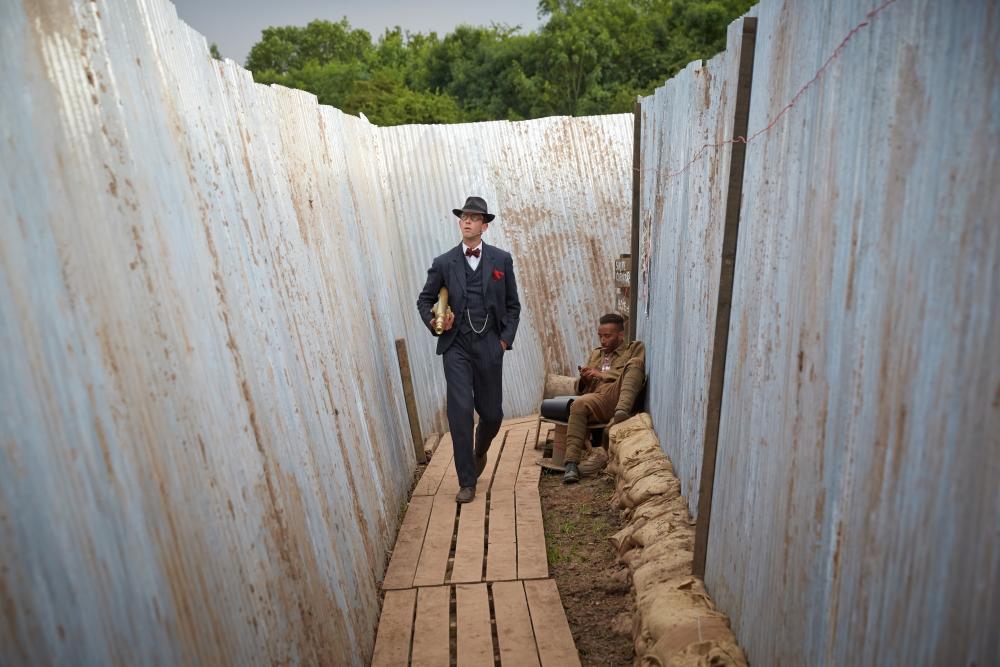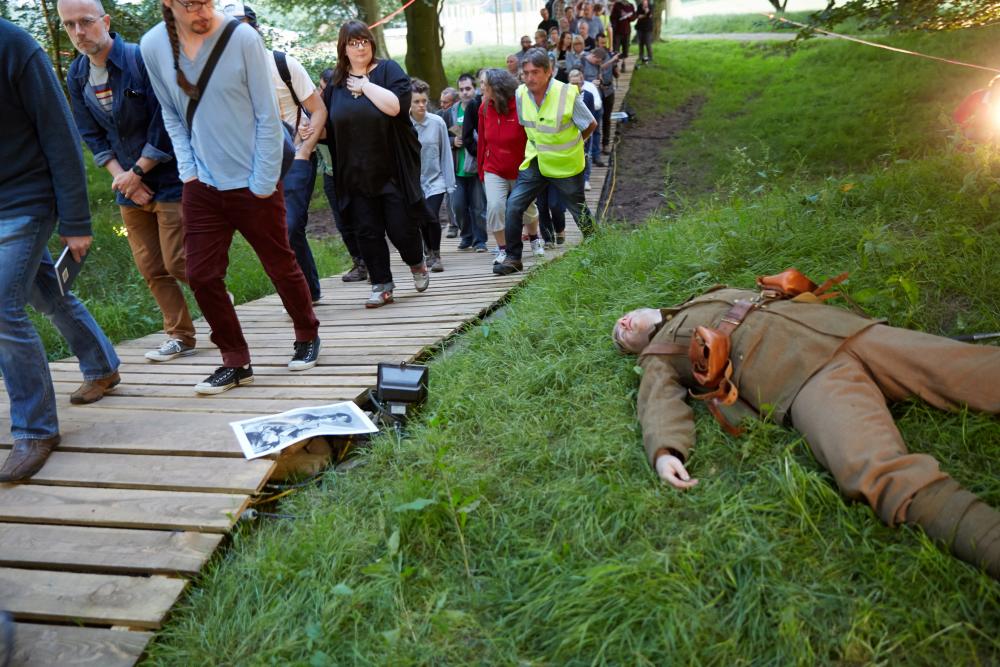Mametz, National Theatre Wales | reviews, news & interviews
Mametz, National Theatre Wales
Mametz, National Theatre Wales
Owen Sheers stages a famous Welsh battle in a field in Monmouthshire
Mametz Wood was the objective of the 38th Welsh Division during the First Battle of the Somme in World War One. Numerous failed attempts to capture the wood were made, during which much Welsh blood was spilt. Mametz therefore holds a great deal of significance for the Welsh and their contribution to the First World War.
Welsh writer Owen Sheers attempts to see the battle through the eyes of the soldiers in his poem on Mametz Wood, and now on a farm near Usk in Monmouthshire he has joined forces with National Theatre Wales to bring his poignant, powerful words to life. Drawing on the works of famous Welsh writers at the Somme such as David Jones and Llewelyn Wyn Griffith, Sheers cleverly intertwines his own words with theirs to create a powerful script featuring with highly convincing characters.

After an introduction the audience is ushered into an abandoned barn where the feel of a conventional theatre is established. The main set features another trench, while a side wall is transformed into a French country house, with soldiers bathing and women working. An older Llewelyn Wyn Griffith appears on his way home from Waitrose, subtly placing the action in context and commenting on his own position in the battle. A young French woman also tells us her own personal history of the wood. Another narrator appears in the form of a Dutch scientist fascinated by Einstein's exciting new theory of relativity. While these narrators connect the fragments of script together, soldiers tell us their own stories, of sweethearts in Caernarfon or families back in London.

A final scene ties up all loose ends. The sad conclusions of these Welshmen's stories really hits home and as the rain begins to fall on the bodies, the audience is left feeling stunned by the sheer brutality of the battle.
Directed by Matthew Dunster and designed by Jon Bausor, the production’s attention to detail is impeccable, right down to the peculiar black silk flashes on the jackets of the Royal Welsh Fusiliers. It is difficult to present a frank yet compelling work on the First World War without resorting to jingoism or sentiment, but Sheers and NTW have achieved it. Mametz seems likely to be the finest commemoration of the Welsh contribution to the Great War.
rating
Share this article
The future of Arts Journalism
You can stop theartsdesk.com closing!
We urgently need financing to survive. Our fundraising drive has thus far raised £49,000 but we need to reach £100,000 or we will be forced to close. Please contribute here: https://gofund.me/c3f6033d
And if you can forward this information to anyone who might assist, we’d be grateful.

Subscribe to theartsdesk.com
Thank you for continuing to read our work on theartsdesk.com. For unlimited access to every article in its entirety, including our archive of more than 15,000 pieces, we're asking for £5 per month or £40 per year. We feel it's a very good deal, and hope you do too.
To take a subscription now simply click here.
And if you're looking for that extra gift for a friend or family member, why not treat them to a theartsdesk.com gift subscription?
more Theatre
 Hamlet, National Theatre review - turning tragedy to comedy is no joke
Hiran Abeyeskera’s childlike prince falls flat in a mixed production
Hamlet, National Theatre review - turning tragedy to comedy is no joke
Hiran Abeyeskera’s childlike prince falls flat in a mixed production
 Rohtko, Barbican review - postmodern meditation on fake and authentic art is less than the sum of its parts
Łukasz Twarkowski's production dazzles without illuminating
Rohtko, Barbican review - postmodern meditation on fake and authentic art is less than the sum of its parts
Łukasz Twarkowski's production dazzles without illuminating
 Lee, Park Theatre review - Lee Krasner looks back on her life as an artist
Informative and interesting, the play's format limits its potential
Lee, Park Theatre review - Lee Krasner looks back on her life as an artist
Informative and interesting, the play's format limits its potential
 Measure for Measure, RSC, Stratford review - 'problem play' has no problem with relevance
Shakespeare, in this adaptation, is at his most perceptive
Measure for Measure, RSC, Stratford review - 'problem play' has no problem with relevance
Shakespeare, in this adaptation, is at his most perceptive
 The Importance of Being Earnest, Noël Coward Theatre review - dazzling and delightful queer fest
West End transfer of National Theatre hit stars Stephen Fry and Olly Alexander
The Importance of Being Earnest, Noël Coward Theatre review - dazzling and delightful queer fest
West End transfer of National Theatre hit stars Stephen Fry and Olly Alexander
 Get Down Tonight, Charing Cross Theatre review - glitz and hits from the 70s
If you love the songs of KC and the Sunshine Band, Please Do Go!
Get Down Tonight, Charing Cross Theatre review - glitz and hits from the 70s
If you love the songs of KC and the Sunshine Band, Please Do Go!
 Punch, Apollo Theatre review - powerful play about the strength of redemption
James Graham's play transfixes the audience at every stage
Punch, Apollo Theatre review - powerful play about the strength of redemption
James Graham's play transfixes the audience at every stage
 The Billionaire Inside Your Head, Hampstead Theatre review - a map of a man with OCD
Will Lord's promising debut burdens a fine cast with too much dialogue
The Billionaire Inside Your Head, Hampstead Theatre review - a map of a man with OCD
Will Lord's promising debut burdens a fine cast with too much dialogue
 50 First Dates: The Musical, The Other Palace review - romcom turned musical
Date movie about repeating dates inspires date musical
50 First Dates: The Musical, The Other Palace review - romcom turned musical
Date movie about repeating dates inspires date musical
 Bacchae, National Theatre review - cheeky, uneven version of Euripides' tragedy
Indhu Rubasingham's tenure gets off to a bold, comic start
Bacchae, National Theatre review - cheeky, uneven version of Euripides' tragedy
Indhu Rubasingham's tenure gets off to a bold, comic start

Add comment